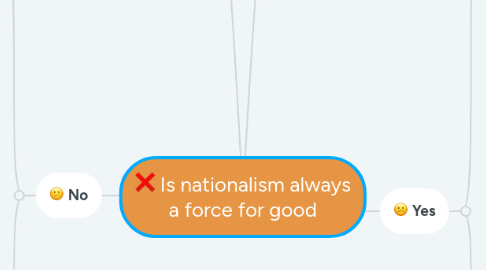
1. No
1.1. Babri Masjid mosque, Ayodhya (Ethnocentrism) (Violence in India)
1.1.1. What
1.1.1.1. RSS (Hindu activists) destroyed the mosque
1.1.1.1.1. Hindus thinking it was on holy ground
1.1.1.1.2. Sparked a lot of riots and terrorist attacks around india
1.1.1.1.3. Thousands of people killed
1.1.1.1.4. By burning
1.1.2. Where
1.1.2.1. Babri Masjid mosque, Ayodhya
1.1.3. When
1.1.3.1. December 6th 1992
1.1.4. Nationalism
1.1.4.1. Ethnic nationalism
1.1.4.1.1. Ethnocentrism = the act of judging another culture and believing that the values and standards of one's own culture are superior
1.1.4.2. Believing that the mosques land is the hindus property
1.1.5. LINK TO QUESTION
1.1.5.1. Destruction
1.1.5.1.1. Property
1.1.5.1.2. Violence
1.1.5.2. Many deaths caused
1.1.5.2.1. Violence
1.1.5.2.2. About 2 thousand
1.2. Citizenship (Amendment) Act (CAA)
1.2.1. What
1.2.1.1. Before the CAA was passed
1.2.1.1.1. You had to live in india for 11 years to gain citizenship
1.2.1.2. After the CAA was passed
1.2.1.2.1. You can have lived in India, Pakistan, Bangladesh, or Afghanistan for 6 years
1.2.1.2.2. EXCEPTION IS IF YOU ARE MUSLIM!!
1.2.1.3. All-India National Register (NRC) was introduced
1.2.1.3.1. People from any religion other than hinduism had to provide birth certificates
1.2.1.4. This is a very non-secular law, however india claims to be a secular state with freedom of religion
1.2.1.5. ANTI-MUSLIMS
1.2.1.5.1. Because there are countries already made for muslims
1.2.1.6. The new citizenship law caused days of unrest
1.2.1.6.1. Muslims have being attacked by Hindu mobs
1.2.1.7. Illegal muslim migrants are referred to as Termites
1.2.2. Where
1.2.2.1. All of india
1.2.3. When
1.2.3.1. December 11, 2019
1.2.4. Nationalism
1.2.4.1. This is the first time in india that religion is needed to behold citizenship
1.2.5. LINK TO QUESTION
1.2.5.1. India claims to be a secular state that has freedom of religion
1.2.5.1.1. This is however the opposite, a very non-secular law
1.2.5.1.2. Having to be hindu to behold citizenship means that there is no freedom of religion
1.2.5.1.3. ANTI-SECULAR
2. Introduction
2.1. Nationalism = the attitude that the members of a nation have when they care about their national identity
2.2. Stats
2.2.1. India’s population is currently 1.339 billion people
2.2.2. Hindus make up 80% of India's population
2.2.3. 13% is Muslim
2.2.4. Just over 2% is Christian
2.3. Can be looked at from both sides
2.3.1. Yes
2.3.1.1. Independence (India)
2.3.1.2. Nationalistic leaders inspired revolutions against unfair treatment
2.3.1.2.1. Salt march
2.3.2. No
2.3.2.1. Caused violence in India (Current state of India)
2.3.2.1.1. The Babri Masjid Mosque
2.3.2.2. The formation of laws such as the CAA
2.4. Thesis statement
2.4.1. Nationalism has many uses, there are many ways in which it has benefited a set back a country.
2.4.2. Nationalism has effectively helped many countries free themselves from outside power and gain independence.
2.4.2.1. India for example gained independence from the british after nationalism start rising throughout their entire country.
2.4.3. However, nationalism is not always a force for good
2.4.3.1. Events such as
2.4.3.1.1. The burning of the Babri Masjid Mosque
2.4.3.1.2. The new CAA
3. Yes
3.1. Independence
3.1.1. The Indian Independence Movement
3.1.1.1. What
3.1.1.1.1. Has an aim of ending the british rule in india
3.1.1.1.2. All events leading up to india's independence
3.1.1.1.3. Spanned a total of 90 years
3.1.1.2. When
3.1.1.2.1. 1857 Start
3.1.1.2.2. 1947 End
3.1.1.3. Where
3.1.1.3.1. All of India
3.1.1.4. Nationalism
3.1.1.4.1. A rise in nationalism lead to the independence
3.1.1.5. LINK TO QUESTION
3.1.1.5.1. United India
3.1.1.5.2. Led to independence
3.2. Nationalistic leaders inspired revolutions against unfair treatment
3.2.1. IMPORTANT - Nationalism didn't give rise too the people, they believed in nationalism to help them help their countries
3.2.2. Mahatma Gandhi (1869-1948)
3.2.2.1. Helped India reach independence
3.2.2.2. Salt march
3.2.2.2.1. What
3.2.2.2.2. Where
3.2.2.2.3. When
3.2.2.2.4. Nationalism
3.2.2.2.5. LINK TO QUESTION
3.2.3. Napoleon Bonaparte (1769-1821)
3.2.3.1. Fought in the french revolution, he fought with the people to overthrow the monarch to make it a democracy
4. Conclusion
4.1. Viewpoint
4.1.1. Nationalism is not always a force for good
4.1.2. As seen by the examples...
